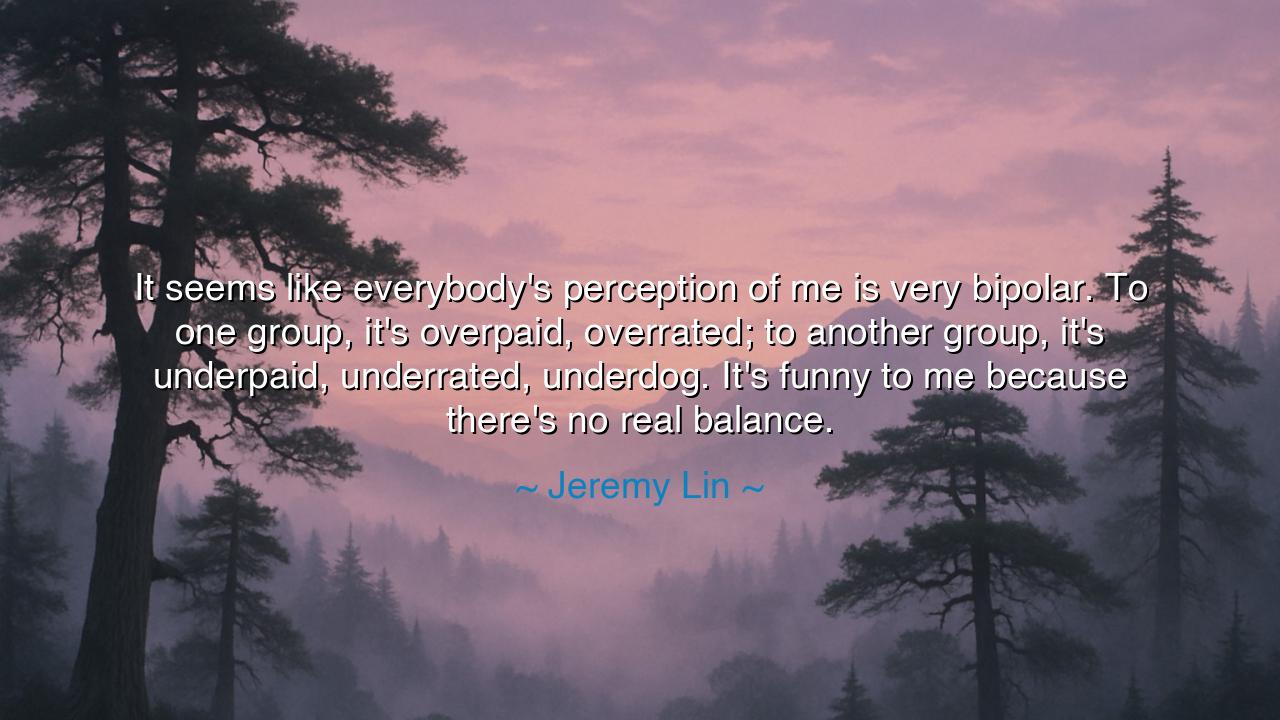
It seems like everybody's perception of me is very bipolar. To
It seems like everybody's perception of me is very bipolar. To one group, it's overpaid, overrated; to another group, it's underpaid, underrated, underdog. It's funny to me because there's no real balance.






When Jeremy Lin said, “It seems like everybody's perception of me is very bipolar. To one group, it's overpaid, overrated; to another group, it's underpaid, underrated, underdog. It's funny to me because there's no real balance,” he was not merely commenting on fame or sport — he was revealing a timeless truth about human perception, about the way the world twists and divides truth according to its own reflection. His words ring with the wisdom of one who has walked through praise and ridicule alike and has learned that both are but mirrors distorted by emotion. It is the voice of one who has seen how swiftly the crowd changes its song — how the same people who raise a man up one day may cast him down the next.
The origin of this quote lies in the story of Lin’s rise — the unforgettable days of “Linsanity,” when he, a young and undrafted player of Taiwanese descent, suddenly became a global sensation. His ascent captured the imagination of millions: a man overlooked, now triumphant; a quiet soul who stunned the mighty on the court. Yet as the fire of fame burned, the winds of opinion changed. Some hailed him as a hero, others dismissed him as a fleeting spectacle. To one crowd, he was the symbol of hard work rewarded; to another, he was the overexposed face of luck. And in this storm of perception, Lin found clarity — that balance, that sense of fair judgment, is rare in the hearts of men.
His words echo an ancient wisdom. The philosopher Epictetus, a slave turned teacher, once said, “If you wish to improve, be content to be thought foolish and stupid.” He understood what Lin discovered centuries later: that public opinion is a tide that cannot be tamed. The world loves extremes — it crowns or crucifies, but seldom understands. To those who strive for greatness, this is both burden and test. For the goal is not to be seen rightly by others, but to see oneself rightly. Lin, in his calm humor, reveals that he no longer fears the judgments of men; he laughs at them. “It’s funny to me,” he says — and in that laughter lies his freedom.
It is a strange and noble thing to be misunderstood. The hero, whether in the arena of sport, war, or art, is always a figure of paradox. The crowd cheers for him, yet knows him not. Consider Socrates, who was called both the wisest man and the corrupter of youth, and who drank poison rather than betray truth. Or Galileo, hailed and hated for daring to say that the earth moved around the sun. Like Lin, they too stood between the extremes of perception — neither wholly praised nor wholly condemned, but distorted by the lenses of their time. Their lesson, like his, is clear: balance must be found within, for the world will never grant it without.
Lin’s reflection also speaks to the heart of modern life, where identity is continually fractured by the opinions of others. In a world ruled by headlines and highlights, we are told who we are by voices that neither know nor care for our truth. But Lin reminds us that even in this storm, one can remain whole. He does not rage against his critics nor cling to his fans; he observes both with equal amusement. His wisdom is the serenity of one who has learned detachment — not coldness, but perspective. For to see the absurdity of contradiction is to rise above it.
Yet his words also carry quiet compassion. He understands that people judge from what they see, not from what they know. The athlete, the artist, the leader — each becomes a symbol upon which others project their hopes and frustrations. To one, Lin represents triumph; to another, excess. But he does not fight to correct them. Instead, he accepts the truth that balance in the eyes of the world is an illusion. True equilibrium can only be built within one’s own soul, through humility, gratitude, and perseverance.
So, my children, let this be your teaching: Do not live by the measure of others’ praise or blame. If they call you overvalued, stay steady; if they call you undervalued, stay humble. The truth of your worth is not found in the voices around you, but in the integrity of your heart. The world will always swing between extremes, for such is its nature — but you must not swing with it. Seek your center. Build your peace on the rock of self-knowledge. Laugh, as Jeremy Lin laughs, at the noise that tries to define you.
For the wise know this: balance is not a gift given by the world — it is a discipline forged within. The one who can hold still amid both praise and insult becomes unshakable, free, whole. And when that balance is found, even the wildest judgments lose their sting. Thus, live not for applause, nor fear ridicule, but walk the narrow way between — the path of truth, humility, and quiet joy.






AAdministratorAdministrator
Welcome, honored guests. Please leave a comment, we will respond soon